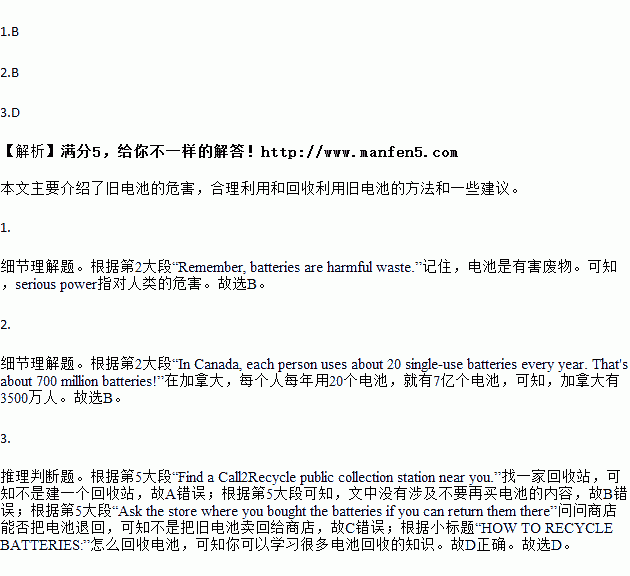题目内容
Give your dead batteries a new life. Recycle them!
 Batteries are used to power clocks, computers, tools and more. However, your batteries have some serious power when their lives are over.
Batteries are used to power clocks, computers, tools and more. However, your batteries have some serious power when their lives are over.


WHY TO RECYCLE BATTERIES:
 Remember, batteries are harmful waste. This means we should properly throw them away. You may not think one little battery can cause that much pollution. But don't think of it as just one battery—there can be millions. In Canada, each person uses about 20 single-use batteries every year. That's about 700 million batteries! If all these batteries end up in landfills (垃圾填埋场),the heavy metals inside them can get into the water, land and air. It can be harmful to humans and wildlife.
Remember, batteries are harmful waste. This means we should properly throw them away. You may not think one little battery can cause that much pollution. But don't think of it as just one battery—there can be millions. In Canada, each person uses about 20 single-use batteries every year. That's about 700 million batteries! If all these batteries end up in landfills (垃圾填埋场),the heavy metals inside them can get into the water, land and air. It can be harmful to humans and wildlife.
By recycling single-use batteries, you can cut down pollution and also help save energy. All batteries are mainly made of plastic and valuable metals. Through recycling programs, dead batteries can be changed into something useful like steel products, or even new batteries! 

 HOW TO RECYCLE BATTERIES:
HOW TO RECYCLE BATTERIES:
 Make a difference by starting to collect batteries at your home or school today. You can prepare a box for battery collection and invite friends, family and classmates to bring in old batteries to be recycled.
Make a difference by starting to collect batteries at your home or school today. You can prepare a box for battery collection and invite friends, family and classmates to bring in old batteries to be recycled.
There are many safe ways to deal with your batteries. You can:
●Find a Call2Recycle public collection station near you. ● Ask the store where you bought the batteries if you can return them there. ●Communicate with your local city government to find out if there are special programs for recycling used batteries! |
For more information, visit https://ecokids. ca/batteries.
1.The phrase "serious power" in the first paragraph shows that ________.
A.dead batteries are also of some value B.dead batteries can bring harm to our life
C.batteries can power electronic products D.batteries are very useful in our daily life
2.From the passage, we can learn that the population of Canada is around ________.
A.20 million B.35 million C.350million D.700 million
3.If you want to recycle your batteries correctly in your city, you can________.
A.build a public collection station B.no more buy batteries from stores
C.sell old batteries to some stores D.learn more about battery recycling

